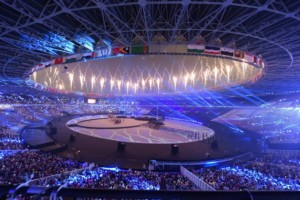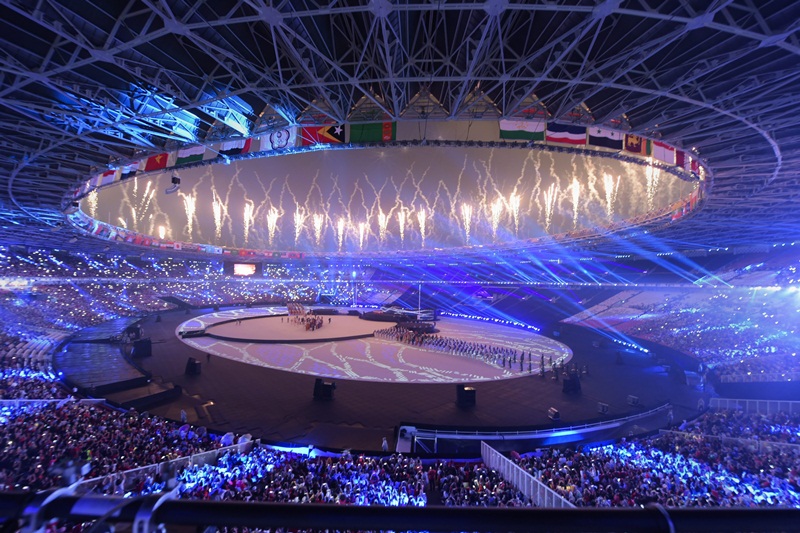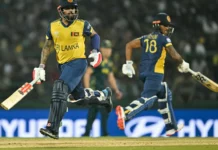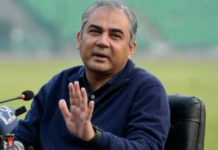 JAKARTA: Indonesia bid an emotional farewell to the 18th Asian Games, displaying the same gritty spirit with which it organized the 15-day sporting extravaganza as thousands braved heavy rain to turn up for a spectacular closing ceremony here.
JAKARTA: Indonesia bid an emotional farewell to the 18th Asian Games, displaying the same gritty spirit with which it organized the 15-day sporting extravaganza as thousands braved heavy rain to turn up for a spectacular closing ceremony here.
The 76,000 capacity Gelora Bung Karno stadium did not attract many people when the track and field events were on but they made a beeline to watch the two-hour long closing ceremony that was high on entertainment. Indonesia’s love for Bollywood was also on full display as singer Siddharth Slathia and Denada sang popular numbers ‘Koi Mil Gaya’, ‘Kuch Kuch Hota Hain’ and ‘Jai Ho’.
As expected, the closing ceremony was not as spectacular as the opening when Indonesian President Joko Widodo made headlines with his bike stunt to enter the venue. But it was fun nonetheless with a heady mix of song, dance and fireworks. Widodo’s video message to his countrymen and the entire Asian continent also added to the excitement.
For the organizers, it was the end of an intense and successful campaign, having got four years to prepare for the second biggest multi-sporting event in the world following Vietnam’s withdrawal. Having two cities — Jakarta and Palembang — as co-hosts was a first in Games’ history, making the herculean task all the more challenging. Hosting more than 11,000 athletes from 45 countries across two contrasting cities was no mean feat but a determined Indonesia pulled it off, overcoming the triple threat posed by terrorism, crime and its notorious traffic.
“Everyone supported, that’s the key. The whole of Indonesia became one and supported the Games. We had a plan since March, 2016. As an organization we made sure we implemented that plan. We also got the best Indonesian talent to support the Games. Did everything work? Not 100 percent. But we tried to solve the issues and did not run away from them,” said Erick Thohir, chief of organizing committee INASGOC.
The successful staging of the Games, happening for the first time in Indonesia since 1962, has also given the country the confidence to bid for the 2032 Olympics. International Olympic Committee President Thomas Bach, who was at the VIP area alongside OCA chief Ahmad Al Fahad Al Sabah and Indonesian Vice-President, has also given thumbs up to the country’s Olympic bid.
While the grand opening ceremony showcased Indonesia’s rich cultural heritage, the closing of the Games was a modest affair but still scored high on liveliness. The spectators reveled in the united spirit of Asia as artists from India, China and Korea performed.
India’s Slathia, one among the six singers who sang the Games anthem in their local language, enthralled the spectators alongside the reputed Ikon and Super Junior from Korea besides Indonesia’s very own like Isyana Saraswati, Dira Sugandi, RAN and Bunga Citra Lestari.
For the physically, mentally and emotionally exhausted athletes, the ceremony gave them an opportunity to let their hair down. Forgetting the intense competition for the moment, the sporting champions mingled to celebrate the occasion rather than parading separately.
China and Japan, who finished an expected first and second in the medals tally, were welcomed vociferously but the roar got louder when the Indonesian contingent marched in. Indonesia finished fourth in the medals tally, a drastic improvement from a top-20 finish in Incheon four years ago. The Indian contingent was led by women hockey team’s captain and flag-bearer Rani Rampal. It was also a memorable Games for India as it produced the best ever performance with 69 medals including 15 gold, 24 silver and 30 bronze. The loudest cheer, however, was reserved for the 13,000 volunteers who worked tirelessly to contribute to the Games’ success.
The ceremony culminated with Ahmad Al Fahad Al Sabah calling on the athletes to meet in four years in Hangzhou, the host for the 2022 Asian Games, before the symbolic handing over of the OCA flag to the Mayor of the Chinese city, Xu Li Yi. A sneak peek video of the next host city was also played out on the giant screen, followed by a short cultural performance. PTI







